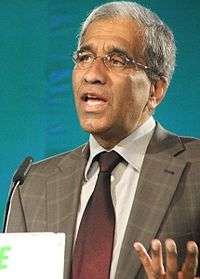Mojib Latif
| Mojib Latif | |
|---|---|
|
Mojib Latif | |
| Born |
September 29, 1954 Hamburg, Germany |
| Citizenship | Germany |
| Nationality | German |
| Fields | Meteorology and Oceanography |
| Institutions | Max Planck Institute for Meteorology |
| Alma mater | University of Hamburg |
| Spouse | Elisabeth Latif |
Mojib Latif (born September 29, 1954) is German meteorologist and oceanographer of Pakistani descent. Latif graduated with a Diplom in meteorology in 1983. He took a position as scientist at the Max Planck Institute for Meteorology in 1985. In 1987 he earned a Ph.D. in oceanography from the University of Hamburg. In 2003 he became professor at IFM-GEOMAR, Kiel, the Leibniz Institute of Marine Sciences. Mojib Latif is a regular guest at TV discussions about global warming.
Academic career
In 2008 Latif was joint author of a modelling study in Nature whose results suggested "global surface temperature may not increase over the next decade, as natural climate variations in the North Atlantic and tropical Pacific temporarily offset the projected anthropogenic warming."[1] At the UN's World Climate Conference 2009 in Geneva Latif gave a talk about prediction that used, amongst other material, results from this paper.[2] New Scientist reported about Latif's research that "we could be about to enter one or even two decades of cooler temperatures".[3] This interpretation has been stated as incorrect in an interview with Latif,[4] after being asked whether he was a global warming sceptic, he explained that "If my name was not Mojib Latif, my name would be global warming. So I really believe in Global Warming. Okay. However, you know, we have to accept that there are these natural fluctuations, and therefore, the temperature may not show additional warming temporarily."[4] In 2000, he gave an interview to the German journal Der Spiegel where he said "Winter with strong frost and a lot of snow, as happened 20 years ago, will no longer exist in our region."[5]
Selected publications
- Keenlyside, N. S.; Latif M.; Jungclaus, J.; Kornblueh, L.; Roeckner, E. (2008). "Advancing decadal-scale climate prediction in the North Atlantic sector". Nature. 453 (7191): 84–88. doi:10.1038/nature06921. PMID 18451859.
- Timmermann, A.; Oberhuber, J.; Bacher, A.; Esch, M.; Latif M.; Roeckner, E. (1999). "Increased El Niño frequency in a climate model forced by future greenhouse warming". Nature. 398 (6729): 694–697. doi:10.1038/19505.
- Latif, M.; Barnett, T. P. (1994). "Causes of Decadal Climate Variability over the North Pacific and North America". Science. 266 (5185): 634–637. doi:10.1126/science.266.5185.634. PMID 17793457.
Personal life
Latif is married to Norwegian born Elisabeth Latif.[6]
References
- ↑ Nature 2008
- ↑ WMO contribution 2009
- ↑ New Scientist 2009
- 1 2 "Scientist Explains Earth's Warming Plateau". National Public Radio. Nov 22, 2009.
- ↑ http://www.spiegel.de/wissenschaft/mensch/winter-ade-nie-wieder-schnee-a-71456.html
- ↑ Ala Al-Hamarneh, Jörn Thielmann. Islam and Muslims in Germany. Brill. p. 325.
External links
 Media related to Mojib Latif at Wikimedia Commons
Media related to Mojib Latif at Wikimedia Commons
